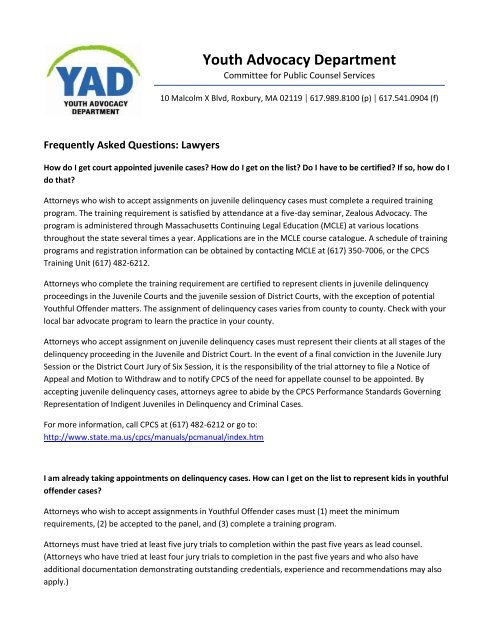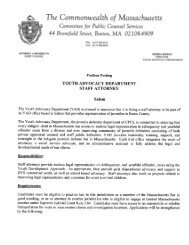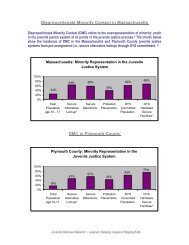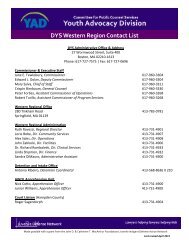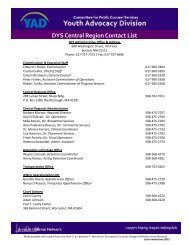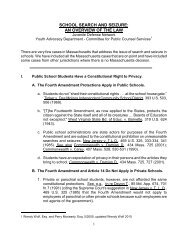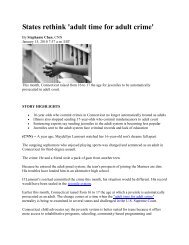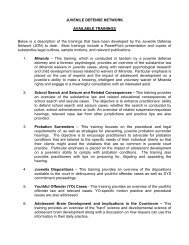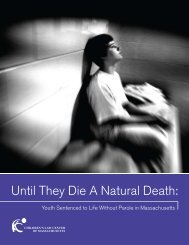pdf version - the Youth Advocacy Division
pdf version - the Youth Advocacy Division
pdf version - the Youth Advocacy Division
Create successful ePaper yourself
Turn your PDF publications into a flip-book with our unique Google optimized e-Paper software.
<strong>Youth</strong> <strong>Advocacy</strong> Department<br />
Committee for Public Counsel Services<br />
10 Malcolm X Blvd, Roxbury, MA 02119 | 617.989.8100 (p) | 617.541.0904 (f)<br />
Frequently Asked Questions: Lawyers<br />
How do I get court appointed juvenile cases How do I get on <strong>the</strong> list Do I have to be certified If so, how do I<br />
do that<br />
Attorneys who wish to accept assignments on juvenile delinquency cases must complete a required training<br />
program. The training requirement is satisfied by attendance at a five-day seminar, Zealous <strong>Advocacy</strong>. The<br />
program is administered through Massachusetts Continuing Legal Education (MCLE) at various locations<br />
throughout <strong>the</strong> state several times a year. Applications are in <strong>the</strong> MCLE course catalogue. A schedule of training<br />
programs and registration information can be obtained by contacting MCLE at (617) 350-7006, or <strong>the</strong> CPCS<br />
Training Unit (617) 482-6212.<br />
Attorneys who complete <strong>the</strong> training requirement are certified to represent clients in juvenile delinquency<br />
proceedings in <strong>the</strong> Juvenile Courts and <strong>the</strong> juvenile session of District Courts, with <strong>the</strong> exception of potential<br />
<strong>Youth</strong>ful Offender matters. The assignment of delinquency cases varies from county to county. Check with your<br />
local bar advocate program to learn <strong>the</strong> practice in your county.<br />
Attorneys who accept assignment on juvenile delinquency cases must represent <strong>the</strong>ir clients at all stages of <strong>the</strong><br />
delinquency proceeding in <strong>the</strong> Juvenile and District Court. In <strong>the</strong> event of a final conviction in <strong>the</strong> Juvenile Jury<br />
Session or <strong>the</strong> District Court Jury of Six Session, it is <strong>the</strong> responsibility of <strong>the</strong> trial attorney to file a Notice of<br />
Appeal and Motion to Withdraw and to notify CPCS of <strong>the</strong> need for appellate counsel to be appointed. By<br />
accepting juvenile delinquency cases, attorneys agree to abide by <strong>the</strong> CPCS Performance Standards Governing<br />
Representation of Indigent Juveniles in Delinquency and Criminal Cases.<br />
For more information, call CPCS at (617) 482-6212 or go to:<br />
http://www.state.ma.us/cpcs/manuals/pcmanual/index.htm<br />
I am already taking appointments on delinquency cases. How can I get on <strong>the</strong> list to represent kids in youthful<br />
offender cases<br />
Attorneys who wish to accept assignments in <strong>Youth</strong>ful Offender cases must (1) meet <strong>the</strong> minimum<br />
requirements, (2) be accepted to <strong>the</strong> panel, and (3) complete a training program.<br />
Attorneys must have tried at least five jury trials to completion within <strong>the</strong> past five years as lead counsel.<br />
(Attorneys who have tried at least four jury trials to completion in <strong>the</strong> past five years and who also have<br />
additional documentation demonstrating outstanding credentials, experience and recommendations may also<br />
apply.)
Attorneys with <strong>the</strong> above minimum qualifications who are interested in being trained and becoming a member<br />
of this panel must send a letter of application to Attorney Helen Fremont, detailing <strong>the</strong>ir most recent (and most<br />
serious or complicated) five jury trials tried to completion in which <strong>the</strong>y were lead counsel, including <strong>the</strong><br />
following information: name of <strong>the</strong> case; date of <strong>the</strong> trial; name of <strong>the</strong> court, judge and prosecutor; charges;<br />
length of trial; issues presented; experts or o<strong>the</strong>r forensic specialists used as witnesses; and any o<strong>the</strong>r relevant<br />
material. Attorneys must also send a recent writing sample of 3-5 pages. Your letter of application should be<br />
sent to:<br />
Helen Fremont, Staff Counsel<br />
Committee for Public Counsel Services<br />
44 Bromfield Street<br />
Boston, MA 02108<br />
For more information, call CPCS at (617) 482-6212 or go to<br />
http://www.state.ma.us/cpcs/manuals/pcmanual/index.htm<br />
If I am not certified to take youthful offender appointments, what do I do when I'm on duty and a youthful<br />
offender eligible case comes in Can I take <strong>the</strong> case Can I do <strong>the</strong> arraignment What should I do if I can't take<br />
<strong>the</strong> case<br />
Attorneys who are not <strong>Youth</strong>ful Offender certified may accept assignments of <strong>the</strong> cases listed below for<br />
ARRAIGNMENT ONLY. Delinquency certified attorneys must immediately notify <strong>the</strong> court and <strong>the</strong> bar advocate<br />
program that <strong>the</strong>y can only represent <strong>the</strong> client at arraignment. Assignment of a <strong>Youth</strong>ful Offender certified<br />
attorney must be made immediately after <strong>the</strong> arraignment. A delinquency certified attorney may accept<br />
assignment of any <strong>Youth</strong>ful Offender eligible case not listed below. If <strong>the</strong> case is indicted, a <strong>Youth</strong>ful Offender<br />
certified attorney must be reassigned to <strong>the</strong> case.<br />
Charges Requiring <strong>Youth</strong>ful Offender Certification:<br />
Aggravated Rape (M.G.L.c.265 §22)<br />
Armed Assault with Intent to Rob/Murder (M.G.L.c.265 §18)<br />
Armed Assault in a Dwelling (M.G.L.c.265 §18A)<br />
Armed Burglary and Assault on Occupant (M.G.L.c.266 §14)<br />
Armed Robbery (M.G.L.c.265 §17)<br />
Assault with Intent to Maim with Injury (M.G.L.c.265 §14)<br />
Assault with Intent to Maim, Kill, or Murder (M.G.L.c.265 §15)
Assault with Intent to Commit Rape (M.G.L.c.265 §24)<br />
Attempted Murder (M.G.L.c.265 §16)<br />
Attempted Arson (M.G.L.c.266 §5A)<br />
Burglary and Assault in a Dwelling (M.G.L.c.266 §14)<br />
Burning a Dwelling House (M.G.L.c.266 §1)<br />
Burning a Public Building (M.G.L.c.266 §2)<br />
Carrying Firearm Without a License (M.G.L.c.269 §10A, D)<br />
Gun Cases (M.G.L.c.269 §10 para (a), (c), or (d), and §10E<br />
Home Invasion (M.G.L.c.265 §18C)<br />
Indecent Assault and Battery (M.G.L.c.265 §13B, F, H)<br />
Kidnapping (M.G.L.c.265 §26)<br />
Manslaughter (M.G.L.c.265 §13)<br />
Mayhem (M.G.L.c.265 §14)<br />
Motor Vehicle Homicide (M.G.L.c.90 §24G)<br />
Possession of Shotgun - Barrel under 18"/Machine Gun (M.G.L.c.269 §10C)<br />
Rape (M.G.L.c.265, §22, 22A, 25)<br />
Statutory Rape (M.G.L.c.265 §23)<br />
If my client is held on bail, how do I find out where he or she is<br />
When juveniles are held on bail, <strong>the</strong>y are transported from court to <strong>the</strong> DYS intake office for <strong>the</strong> area in which<br />
<strong>the</strong>y live (not <strong>the</strong> area of <strong>the</strong> court from which <strong>the</strong>y were arrested). DYS has four regions. Call <strong>the</strong> intake<br />
department for <strong>the</strong> appropriate region.<br />
Metro - (617) 727-2995<br />
Central - (508) 792-7611<br />
Sou<strong>the</strong>astern - (508) 821-2717 x817<br />
Western - (413) 784-1193
How can I get a bail review in superior court<br />
Juvenile bail review procedures vary among counties. It is important to find out what <strong>the</strong> practice is in your<br />
county. You should state on <strong>the</strong> record at arraignment that you are requesting a bail petition and ask <strong>the</strong> judge<br />
to complete his or her reasons for bail, obtain and file <strong>the</strong> proper paperwork, make sure DYS has <strong>the</strong> necessary<br />
paperwork to bring your client in for a bail petition, and inform your client's family where <strong>the</strong> bail review will be<br />
heard.<br />
Are <strong>the</strong>re different issues regarding bail for children as opposed to adults<br />
M.G.L.c.276 §58 applies to juveniles -- a presumption of personal recognizance exists. Since you are dealing with<br />
children, courts often look at different factors. The court may be concerned about how your client is doing in<br />
school and at home, such as whe<strong>the</strong>r <strong>the</strong>y comply with curfew and home rules. You should be prepared to<br />
answer <strong>the</strong>se questions at arraignment. The judge may release your client under pre-trial conditions pursuant to<br />
M.G.L.c.276 §87. See Jake J. v. Commonwealth, 433 Mass. 70 (2000).<br />
Will my client's court case affect his or her ability to stay in school What can I do to help Will I get paid<br />
M.G.L.c.71 §37H _ provides that upon issuance of a criminal or delinquency complaint charging a student with a<br />
felony, <strong>the</strong> principal of <strong>the</strong> school <strong>the</strong> student attends may suspend him/her for as long of a period of time as<br />
<strong>the</strong> principal deems appropriate. The principal may suspend a student even if <strong>the</strong> alleged incident happened off<br />
school grounds, and has nothing to do with school. In order to suspend <strong>the</strong> student, <strong>the</strong> principal must<br />
determine that <strong>the</strong> student's continued presence at <strong>the</strong> school would have a "substantial detrimental effect" on<br />
<strong>the</strong> general welfare of <strong>the</strong> school. The student must be provided written notice of <strong>the</strong> charges and reasons for<br />
<strong>the</strong> principal's decision, before <strong>the</strong> suspension takes effect. The student must also receive notice of his or her<br />
right to appeal this decision to <strong>the</strong> superintendent of schools, and <strong>the</strong> process for pursuing this appeal. If <strong>the</strong><br />
student wishes to appeal <strong>the</strong> principal's decision, he or she must notify <strong>the</strong> superintendent in writing no later<br />
than five days after <strong>the</strong> effective date of <strong>the</strong> suspension. If <strong>the</strong> student appeals <strong>the</strong> principal's decision, he or she<br />
is entitled to a hearing within three calendar days of <strong>the</strong> request. At <strong>the</strong> hearing, <strong>the</strong> student has <strong>the</strong> right to<br />
present oral and written testimony on his or her behalf and has <strong>the</strong> right to have an attorney present. The<br />
superintendent has <strong>the</strong> authority to overturn or alter <strong>the</strong> decision of <strong>the</strong> principal, including recommending an<br />
alternative educational program for <strong>the</strong> student. The superintendent must issue a decision within five calendar<br />
days of <strong>the</strong> hearing. If <strong>the</strong> student's due process rights were violated, <strong>the</strong> decision may be appealed to superior<br />
court.<br />
A student may be expelled upon adjudication or conviction of a felony. The same notice, due process and<br />
appeals procedures stated above apply to children who are adjudicated delinquent or convicted of a felony.<br />
Students who receive special educational services have more protections than regular education students. In<br />
order to exclude a special education student <strong>the</strong> TEAM must make a determination that <strong>the</strong> conduct in question<br />
was not a manifestation of <strong>the</strong> student's disability. Title 20, Chapter 33, Section 1415 of <strong>the</strong> United States Code<br />
outlines <strong>the</strong> procedural safeguards children with disabilities must be provided when charged in criminal or<br />
delinquency proceedings.
As <strong>the</strong> student's attorney, you can initiate <strong>the</strong> appeal process and in turn represent <strong>the</strong> student at <strong>the</strong><br />
suspension or expulsion hearing. Effective representation at <strong>the</strong>se proceedings requires that you first obtain a<br />
release from <strong>the</strong> student and his or her parent and assemble his or her school records. You should also obtain a<br />
copy of <strong>the</strong> school handbook and M.G.L.c.71, §37H_. You should also obtain a copy of Title 20, Chapter 33,<br />
Section 1415 if your client receives special education services.<br />
At present, CPCS is only paying attorneys who call and receive individual permission to represent <strong>the</strong>ir clients at<br />
<strong>the</strong>se hearings. Individual permission has been granted where <strong>the</strong> school hearing bears a direct relationship to<br />
<strong>the</strong> client's case, i.e., <strong>the</strong> offense is alleged to have happened on school grounds. To obtain individual<br />
permission, you should contact Helen Fremont at (617) 482-6212. Attorneys can also seek indigent court cost<br />
funds for <strong>the</strong> purposes of hiring an educational advocate, but should consult <strong>the</strong> CPCS guidelines for <strong>the</strong> specific<br />
definition of an education advocate prior to hiring one.<br />
Will a delinquency finding or youthful offender conviction affect my clients' immigration status What can I<br />
do about this How do I advise my client<br />
At this time we are unaware of delinquency cases or youthful offender cases leading directly to deportation.<br />
However, it seems likely that <strong>the</strong> INS will eventually view <strong>Youth</strong>ful Offender adjudications as identical to adult<br />
convictions. It is also <strong>the</strong> case that both delinquency and youthful offender adjudications may be used now to<br />
exclude aliens who have left <strong>the</strong> country and are attempting to reenter. They may also be used to deny people<br />
green cards or citizenship. In Massachusetts, a "continued without a finding (CWOF)" disposition is a conviction<br />
for immigration purposes. It is always advisable to avoid adjudication if possible. It may also be important to<br />
avoid adjudications on certain charges. We highly recommend consulting with an immigration attorney before<br />
resolving <strong>the</strong> case. It is unlikely that an immigration attorney could give your client good advice without speaking<br />
with you. Contact <strong>the</strong> National Immigration Project at (617) 227-9727 for more detailed advice.<br />
Once a child is committed to DYS, how much time will <strong>the</strong>y actually do How do I advise my client about this<br />
DYS has a classification grid that outlines <strong>the</strong> minimum and maximum treatment times for every offense. DYS<br />
will use your client's most serious offense to determine where he or she will be placed on <strong>the</strong> grid. Your client<br />
will have to do at least <strong>the</strong> minimum time shown on <strong>the</strong> grid. It is best to stress to your client that this is <strong>the</strong><br />
least amount of time that he or she will have to do in a program, and that he or she may have to do longer than<br />
this. The time is considered "treatment time" by DYS. The amount of time assigned to a client by DYS is<br />
considered a guideline. This means that your client will not be released until DYS believes that your client has<br />
completed his or her treatment and is ready to go back into <strong>the</strong> community. Unlike a state prison or house of<br />
correction sentence, it is not set in stone. You can obtain a copy of this grid from DYS by calling (617) 727-7575.
Once my client is committed to DYS, what actually happens Should I be assisting my client in this area Will I<br />
get paid<br />
Once your client is committed to DYS, <strong>the</strong>re is a 30-45 day assessment period. During this time, a program<br />
clinician or a DYS caseworker writes a case history about your client. If you have information that will assist your<br />
client, it is helpful to share this.<br />
At <strong>the</strong> end of <strong>the</strong> assessment period, a staffing is held. A staffing is a meeting in which a DYS program clinician, a<br />
DYS caseworker and manager, your client and <strong>the</strong>ir family, and any o<strong>the</strong>r interested parties make a decision as<br />
to where your client will be placed and for how long. This is a very important meeting and you can assist your<br />
client by attending <strong>the</strong> staffing and advocating on his behalf. It is possible that you will have more knowledge<br />
about your client than anyone o<strong>the</strong>r professional at <strong>the</strong> table. You may also know facts about <strong>the</strong> client's case<br />
that may be helpful to explain since <strong>the</strong>y may not be clear in <strong>the</strong> police reports. You should also prepare your<br />
client to talk about <strong>the</strong> facts of <strong>the</strong> case on which he or she was committed. Your client will be asked questions<br />
and will be expected to speak. At <strong>the</strong> end of <strong>the</strong> meeting, a recommendation will be made regarding <strong>the</strong> place<br />
and amount of time your client will do his treatment. The recommendation must be approved by <strong>the</strong> DYS<br />
Regional Area Review Team, which makes <strong>the</strong> final classification decision and can approve or disapprove of any<br />
recommended deviations from <strong>the</strong> DYS grid.<br />
If you are have been appointed on <strong>the</strong> case and are billing CPCS for your services, you can bill for all postdispositional<br />
advocacy you provide to your client through <strong>the</strong> DYS staffing process.<br />
To find out <strong>the</strong> name of <strong>the</strong> caseworker assigned to your client, contact <strong>the</strong> appropriate region of DYS at <strong>the</strong><br />
telephone numbers below:<br />
Metro - (617) 727-2995<br />
Central - (508) 792-7611<br />
Sou<strong>the</strong>astern - (508) 821-2717 x817<br />
Western - (413) 784-1193<br />
Can a juvenile's family be evicted from public housing for crimes <strong>the</strong> juvenile has been charged with<br />
Both State and Federal law permit eviction of <strong>the</strong> family from public housing, based upon allegations of criminal<br />
conduct by anyone in <strong>the</strong> family. A conviction is not necessary.<br />
Will a delinquency or youthful offender conviction affect my clients' ability to get a driver's permit or license<br />
Yes. Many convictions will affect one's ability to get or keep a license. Most, if not all, convictions or delinquency<br />
findings for drug offenses will result in a license suspension. A license may also be suspended for motor vehicle<br />
offenses or offenses involving a car, e.g. larceny of a motor vehicle, operating to endanger, etc. The duration of<br />
<strong>the</strong> suspension depends upon <strong>the</strong> crime. You should consult M.G.L.c.90 §22 and inform your client of any<br />
consequences resulting from a conviction before he or she decides how to resolve <strong>the</strong> case. You should always
look at <strong>the</strong> statute to see if your client is charged with an offense involving any type of suspension or revocation.<br />
You may also consult <strong>the</strong> Registry of Motor Vehicles to find out which offenses fall under administrative<br />
suspensions and revocations.<br />
In what type of cases can a child be indicted as a youthful offender and what are <strong>the</strong> consequences<br />
M.G.L.c.119 §54 sets forth <strong>the</strong> criteria needed to indict a child as a youthful offender. In order to be indicted, <strong>the</strong><br />
child must be charged with a felony while between <strong>the</strong> ages of 14 and 17. Additionally, one of <strong>the</strong> following<br />
factors must exist: (1) <strong>the</strong> child has previously been committed to DYS, or (2) <strong>the</strong> offense involves <strong>the</strong> infliction<br />
or threat of serious bodily harm, or (3) <strong>the</strong> child is charged with a gun offense under paragraphs (a), (c) or (d) of<br />
§10 or §10E of M.G.L.c.269.<br />
If a child is found guilty as a youthful offender he or she can receive any of <strong>the</strong> following sentences: (see<br />
M.G.L.c.119 §58)<br />
1. The adult term as provided by law for <strong>the</strong> offense<br />
2. A combination sentence - a commitment to DYS to age 21 with a suspended adult sentence to <strong>the</strong> house of<br />
corrections or state prison, as is provided by law. The suspended adult sentence may run concurrent with <strong>the</strong><br />
DYS commitment. A child receiving a combination sentence is under <strong>the</strong> custody and control of DYS until age 21<br />
or until discharged, and <strong>the</strong>reafter under <strong>the</strong> supervision of juvenile court probation until <strong>the</strong> age of 21, and<br />
<strong>the</strong>reafter under <strong>the</strong> supervision of adult probation. If a child does not successfully complete his or her DYS<br />
commitment he or she can be surrendered and <strong>the</strong> adult sentence can be imposed. The suspended portion of<br />
<strong>the</strong> sentence can run short of or go beyond age 21.<br />
3. Commitment to DYS to age 21. While <strong>the</strong> statute does not state explicitly that commitment to age 21 cannot<br />
be suspended, judges have divergent views on this. There is a good argument that this is a legal sentence.<br />
Do youth have to register under <strong>the</strong> sex offender registry law<br />
Yes. The Sex Offender Registry applies to children as well as adults. Any child facing charges of a sexual nature<br />
should discuss <strong>the</strong> Sex Offender Registry with his or her attorney before making any decisions on <strong>the</strong> case. For<br />
<strong>the</strong> most up-to-date information on <strong>the</strong> Sex Offender Registry, call <strong>the</strong> Committee for Public Counsel Services at<br />
(617) 482-6212.


